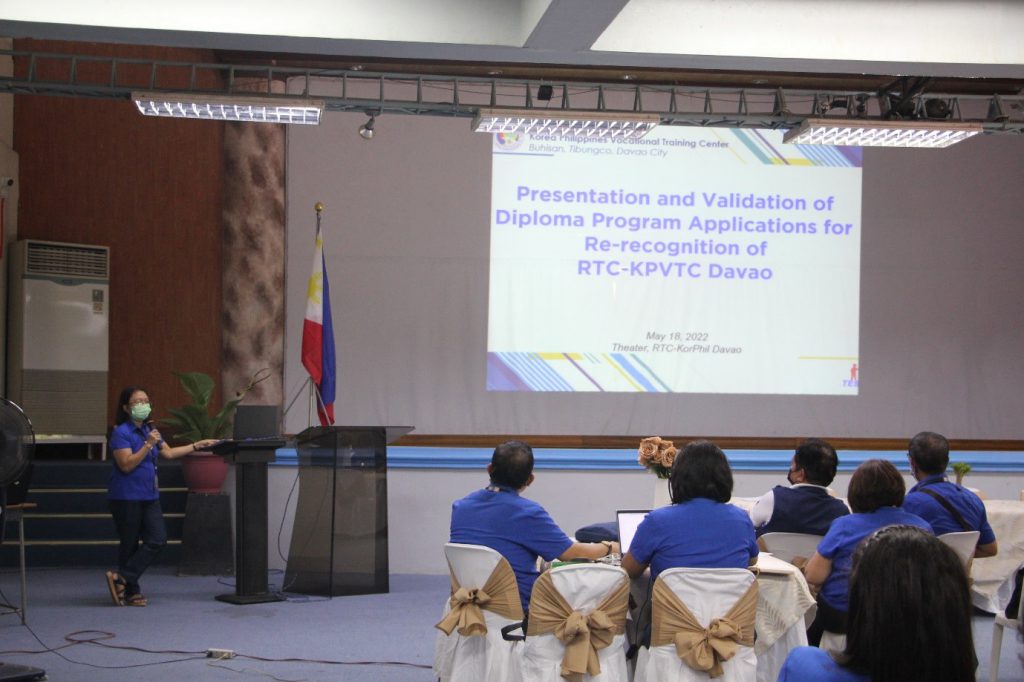On May 18, 2022, the Head Trainers of nine (9) Diploma of Technology Programs of TESDA XI – RTC-KorPhil, Davao successfully presented their Diploma Programs Package to the Regional Diploma Technical Working Group headed by Dir. Remegias G. Timonio, the Provincial Director of Davao Oriental. Significant developments in the execution of Diploma programs that need to be cascaded to TVET implementers were covered during the presentation. The program also provided an opportunity to address questions and concerns about re-recognition in a Diploma program.
The repackaged programs were presented by the head trainers and junior trainers. Mr. Rhian Dhae Sarsaba, head trainer of Diploma in Industrial Automation and Mechatronics (DIAMT) delivered the four (4) perspectives of their programs. The Diploma in IAMT is compliant to the Program Framework, Program Schedule and Course Specification, Satisfaction of PLOs and PIs through Course Outcomes, and Implications to Articulation and Credit Transfer Agreements.
Ms. Maribel Tero, the Head Trainer of Diploma in Civil Engineering Technology presented their curriculum. Their Diploma is compliant to the four (4) perspective. Comments and suggestions were given after the presentation. The members of RDTWG mentioned that Laboratory Workshops should be established for Chemistry and Physics courses and Core Competencies should harmonize with Policy, Standards, Guidelines (PSG) of Commission on Higher Education (CHED).
The Diploma in Information Technology headed by Mr. Mario M. dela Cerna showcased their repackaged program. The DIT program is compliant to the Program Framework with 6 qualifications embedded up to the highest qualification level and also the 17 Program Learning Outcomes (PLO) adopted. Their program is also compliant to Perspective 2 that focuses on Program Schedule and Course Specification, Perspective 3 that emphasizes on Satisfaction of PLOs and PIs through Course Outcomes, and Perspective 4 that highlights the Implications to the Articulation and Credit Transfer Agreements.
The Diploma in Hotel and Restaurant Technology (DHRT) headed by Ms. Marilou F. Coloma also presented their program followed by Mr. Eugene Valdez, the head trainer of Diploma in Heating, Ventilating, Airconditioning/Refrigeration Technology (DHVACRT). Engr. Lougino Miguel, the junior trainer of Diploma in Agricultural and Biosystems Engineering Technology also shared their program to the RDTWG which was immediately followed by Engr. Robert K. Arnaez, the head trainer of Diploma in Mechanical Engineering Technology. Mr. Joseph I. Junio shared the acquiescent program. Mr. Junio is the head trainer of Diploma in Welding Technology. The head trainer of Diploma in Automotive Technology (DAT), Mr. Armando D. Bolivar showcase their compliant program.
With reference to TESDA Circular No. 38, Series of 2017 re: “Implementing Guidelines for the Program Under PQF Level 5 (Diploma) Pilot” which aimed to scale up technical education and address the need to further develop the global competitiveness of the Filipino workers, the Diploma programs covered by this Circular are described by the agreed and developed seventeen (17) Program Learning Outcomes (PLOs) that are adherent to the PQF Level 5 descriptors, and the graduate attributes of the Sydney Accord (Engineering Technologist) completed with the identified competencies of the 21st Century Skills such as collaboration and teamwork, creativity and imagination, critical thinking, and problem-solving, as well as subjects such as Mathematics, Physics and Chemistry.
The recognition of the TVET PQF Level 5 (Diploma) programs is in line with the issuance of Republic Act No. 10968 entitled “An Act Institutionalizing the Philippine Qualifications Framework (PQF) on 16 January 2018 and the referencing of the PQF with the ASEAN Qualifications Reference Framework (AQRF) towards greater mobility of students and professionals within the ASEAN region. As part of the referencing process, the Philippines requires to undergo the process stipulated in the AQRF Referencing Guidelines that include Criterion 3, which illustrates the procedures for inclusion of qualifications in the Philippine Qualifications Register (PhQuaR), which is the national database of quality-assured qualifications authorized under the PQF being managed by TESDA.

